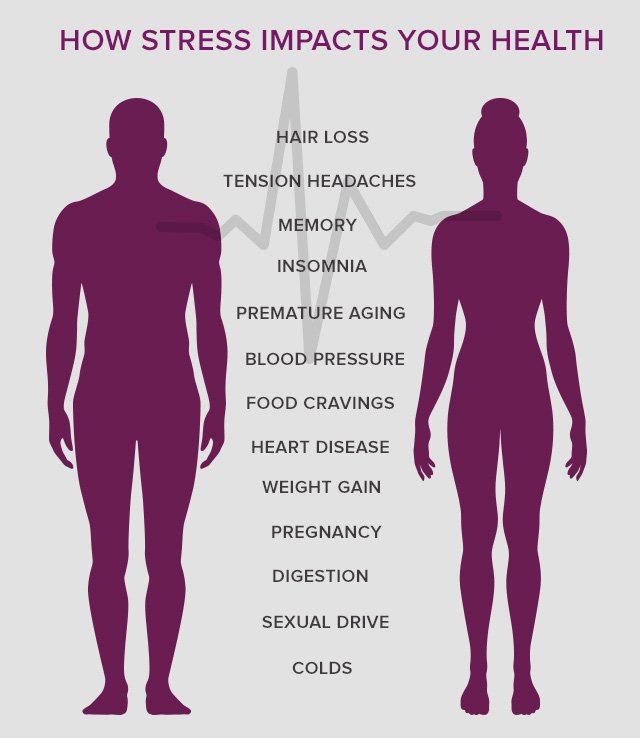THE DISTURBING EFFECTS OF STRESS ON YOUR HEALTH AND WELL-BEING
Sleeplessness, headaches, weight gain, indigestion. Chances are you’ve experienced at least one of these symptoms recently. You may have even consulted a physician. But despite how common these afflictions are, they are often misdiagnosed. And the reason for that has nothing to do with how rare the underlying condition is. In fact, it’s because the condition is so common that it’s easy to overlook.
Stress.
Stress has become so prevalent in today’s society that we don’t tend to think much of it. But countless scientific studies have shown that stress has a serious impact on our health and well-being. It even produces symptoms equivalent to complications from hypertension and autoimmune disorders.
But knowledge is power. The more you understand where your symptoms may come from, the more focus you can direct towards addressing the underlying problem. And to help you discern what ailments may be stress-related, we break down the ways stress impacts your health:
THE 14 WAYS STRESS IMPACTS YOUR PHYSICAL HEALTH
Blood pressure: Stress can raise your blood pressure by temporarily constricting your blood vessels and speeding up your heart rate. This can be harmful to your health if sustained over time.
Food cravings: When you are under stress, you may find it harder to resist cravings for sugar or fat. You may also find yourself eating in an attempt to fulfill emotional needs — sometimes called stress eating or emotional eating.
Weight gain: Research has shown that when your stress and cortisol levels are high, the body actually encourages the storage of fat, particularly in the lower abdomen area. This belly fat, also known as visceral fat, in turn increases inflammation and insulin resistance in the body.
Heart disease: Coronary heart disease has been found to be significantly more common in individuals subjected to chronic stress. The incidence of heart attacks has also been shown to increase as a consequence of severe stress.
Insomnia: Stress causes insomnia by making it difficult to fall asleep and to get a solid night’s rest. Stress also causes hyperarousal, which can upset the balance between sleep and wakefulness.
Tension headaches: Stress causes your body to release chemicals like adrenaline and cortisol. These chemicals can cause vascular changes that leave you with a tension headache or migraine. Researchers have also found that stress-induced fluctuations in neurotransmitters — like serotonin and endorphins — also activate pain pathways in the brain, leading to headaches.
Memory: Chronic stress has been shown to reduce spatial memory: the memory that helps you recall locations and relate objects. Researchers have also found a connection between an increase of cortisol and difficulty to form new memories.
Hair loss: Acute stress has been shown to trigger three types of hair loss known as telogen effluvium, trichotillomania, and alopecia areata.
Pregnancy: Severe stress can increase the chances of premature labor. There have even been some studies that suggest very high levels of stress can affect the developing fetal brain.
Digestion: Stress can cause or worsen heartburn, stomach cramping and diarrhea. The common digestion issue known as IBS, irritable bowel syndrome, is also thought to be fueled by stress.
Brain function: Brain-imaging studies have shows that chronic stress can reduce the amount of tissue in regions of the brain that regulate emotions and self-control.
Premature aging: Chronic stress can shorten telomeres, the protective caps on the ends of cell chromosomes. As telomeres shorten, their cells age faster and die younger, contributing to premature aging and shorter human lifespans.
Colds: Stress weakens the immune systems, making it difficult for individuals exposed to common cold viruses to fight off the germs successfully.
Sexual drive: Research suggests that individuals who are stressed out tend to have a decreased sex drive and a less pleasurable experience during intercourse.
Source


Hi! I am a robot. I just upvoted you! I found similar content that readers might be interested in:
https://www.tonyrobbins.com/health-vitality/stress-in-america-study/
Nice post. Stress can affect health negatively.
Hi @plentyofastrid
Excellent article. I subscribed to your blog. I will follow your news.
I will be grateful if you subscribe to my blog @user2627
Good luck to you!